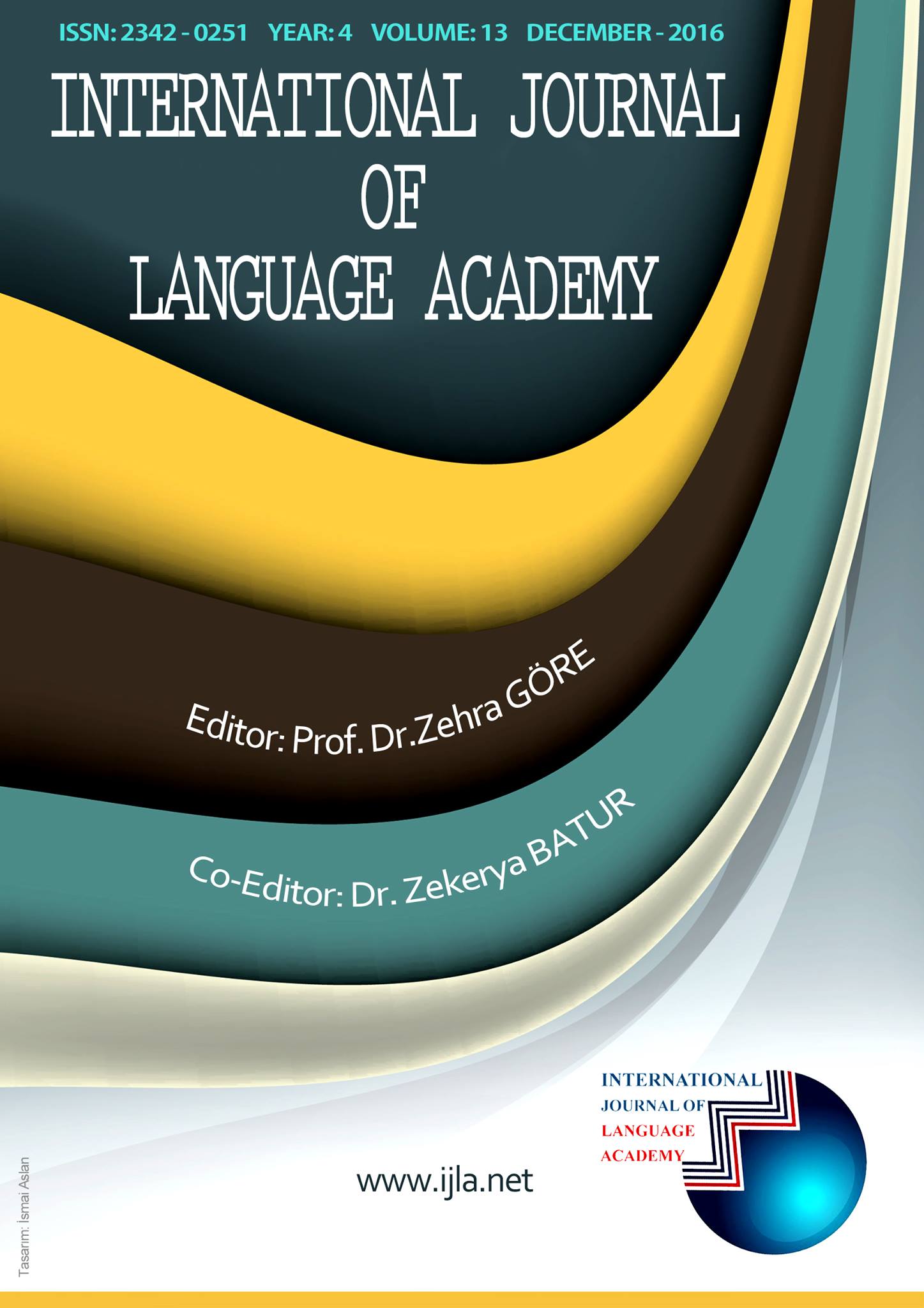Author :
Abstract
Bu çalışma, belirli bir yükseköğrenim kurumundaki katılımcıların nezaketsizlik algılarına dair çeşitliliği araştırmaktadır. Çalışmanın verileri, Işık-Güler (2008) in çalışmasında kullanılan bir anketin uyarlanması yoluyla elde edilmiş olup, katılımcılar 5 soruluk ve çoğunlukla açık uçlu sorulardan oluşan bir anketi cevaplamasıyla elde edilmiştir. Işık-Güler’in (2008) çalışmasında da belirtildiği üzere nezaketsizlik kavramının Türkçe’ de farklı bileşenler aracılığıyla tanımlanabileceğini dikkate alarak, bu çalışmanın alanı bu kavramın Türkçedeki en sık karşılığı olan kaba/lık kelimesinin çağrışımlarıyla sınırlandırıldı. Veriler, Spencer-Oatey’ e ait olan (2002) ve Culpeper, Marti, Mei, Nevala, and Schauer (2010) tarafından da kolay anlaşılır bir şekilde sunulan analitik çerçeveye dayalı olarak analiz edildi. Sayısal analiz, akademisyenlerin temel olarak sosyal kimlik yüzü ile ilgili çiğnemelere karşı daha hassas olurken, öğrencilerin hem yüz hem hak ile ilgili açılardan daha kırılgan olduğunu göstermiştir. Katılımcıların fazla olay rapor etmemesinden dolayı elde edilen sınırlı veri sayısı, bizim sonuçlardan genel çıkarımlarda bulunmamıza imkân vermemektedir. Yine de, sonuçlar, pozitif bir kurumsal kültürün oluşturulması ve iddialı yorumlar yapılabilmesi için, gelecekte bu kuruma özgü çalışmaların yürütülmesinin ve kurumdaki insanların nezaketsizlik olarak algılanan olaylara dair somut örneklerle bilgilendirilmesinin faydalı olacağı izlenimini vermektedir.
Keywords
Abstract
This paper investigates variation in terms of perception of impoliteness among the members of a specific higher educational institution. The data for this study was collected via a questionnaire which was adapted from Işık-Güler (2008) and it comprises of participants’ written feedback on a 5-item questionnaire consisting of mainly open-ended questions. Considering that the concept of impoliteness may be described with different components in Turkish as Işık-Güler’s study indicates, the scope of this study was limited to the most frequent association of it in Turkish, that is the word ‘Kaba/lık’, equivalent of rude/ness. The data was analysed utilizing a version of Spencer-Oatey’s (2002) analytical framework, which was presented in a coherent way by Culpeper, Marti, Mei, Nevala, and Schauer (2010). Our quantitative analysis suggests that academicians were more mainly vulnerable to violation of social identity face while learners were detected to be influenced by threats from both face and rights concerns. Since the data was quite limited in number mainly because the informants did not report a lot of incidents, I avoid drawing general conclusions from the results. Though, results give us the insight that in order to form a positive institutional culture and reach sound comments, future studies specific to this institution should be conducted and people in the institution should be informed about what is construed as impolite.
Keywords
- Brown, P., & S. Levinson, (1987). Politeness: Some universals in language usage. Cambridge: Cambridge University Press.
- Chen, S., Boucher, H. C., & Tapias, M. P. (2006). The relational self revealed: integrative conceptualization and implications for interpersonal life. Psychological Bulletin, 132(2), 151-179.
- Culpeper, J. (2008). Reflections on impoliteness, relational work and power. In D. Bousfield & M.A. Locher (eds). Impoliteness in Language. Studies on its Interplay with Power in Theory and Practice (pp.17-44). Berlin: Mouton de Gruyter.
- Culpeper, J., Marti, L., Mei, M., Nevala, M., & Schauer, G. (2010). Cross-cultural variation in the perception of impoliteness: A study of impoliteness events reported by students in England, China, Finland, Germany and Turkey. Intercultural Pragmatics, 7(4), 597-624.
- Grainger, K. (2002). Politeness or impoliteness? Verbal play on the hospital ward. Working Papers on the Web, Sheffield Hallam University, UK. Retrieved online on November, 11, 2016 from http://extra. shu. ac. uk/wpw/politeness/grainger. Htm
- Haugh, M. (2007). Emic conceptualisation of (im)politeness and face in Japanese: Implications for the discursive negotiation of second language learner identities. Journal of Pragmatics, 39, 657-680.
- Haugh, M. (2015). Impoliteness and taking offence in initial interactions. Journal of Pragmatics, 86 (1), 36-42.
- House, J. (2010). Impoliteness in Germany: Intercultural encounters in everyday and institutional talk. Intercultural Pragmatics, 7(4), 561-595.
- Hill, B., Ide, S., Ikuta, S. Kawasaki, A., & Ogino, T. (1986). Universals of linguistic politeness: Ouantitative evidence from Japanese and American English. Journal of Pragmatics, 10(3), 347-371.
- Işık-Güler, H. (2008). Metapragmatics of (Im)politeness in Turkish: An exploratory emic investigation. Unpublished PhD Dissertation, Middle East Technical University, Turkey.
- Leech, G. (2005). Politeness: Is there an East-West divide. Journal of Foreign Languages, 6(3), 1-30.
- Locher, M. A., & Watts, R. J. (2005). Politeness theory and relational work. Journal of Politeness Research, Language, Behaviour, Culture, 1(1), 9-33.
- Locher, M. A., & Watts, R. J. (2008). Relational work and impoliteness: Negotiating norms of linguistic behaviour. In D. Bousfield and M. A. Locher (eds), Impoliteness in Language. Studies on its Interplay with Power in Theory and Practice (pp.77-99). Berlin: Mouton de Gruyter. Retrieved on September, 20, 2016; doi: 10.1515/9783110208344.2.77
- Mullany, L. (2008). ``Stop hassling me!'' Impoliteness, power and gender identity in the professional workplace. Language Power and Social Relations, 21, 232-252.
- Spencer-Oatey, H. (2002). Managing rapport in talk: Using rapport sensitive incidents to explore the motivational concerns underlying the management of relations. Journal of Pragmatics, 34(5), 529-545.
- Spencer-Oatey, H. (2007). Theories of identity and the analysis of face. Journal of Pragmatics, 39, 639-656.
- Terkourafi, M. (2008). Toward a unified theory of politeness, impoliteness, and rudeness. Impoliteness in Language: Studies on its Interplay witj power in theory In D. Bousfield and M. A. Locher (eds), Impoliteness in Language. Studies on its Interplay with Power in Theory and Practice (pp.45-76). Berlin: Mouton de Gruyter.
- Waters, S. (2012). ‘It’s rude to VP’: The cultural semantics of rudeness. Journal of Pragmatics, 44, 1051-1062.
- Zeyrek, D. (2001). Politeness in Turkish and its linguistic manifestations. In A. Bayraktaroğlu and M. Sifianou (eds.), Linguistic politeness across boundaries. The case of Greek and Turkish, (pp.43-73). Amsterdam: John Benjamin Publishing Company.
